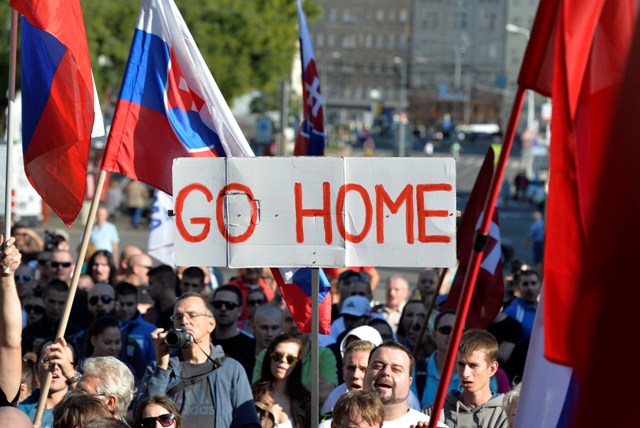Nationalism Negates Progress
Protesters at an anti-immigration march in Bratislava, Slovakia on Sep 12, 2015.
September 12, 2016
By Rachel Vigil
Now that the school year has started, it’s a good practice to reflect on the summer that’s just passed.
Unfortunately, this summer was not as bright or cheerful as it ought to have been due to attacks that killed innocent people at home and abroad. All of this was framed by reports of ISIS being on its last leg and a shaken European Union, still grappling with the vote for Great Britain to take its leave.
The underlying cause for many of the catastrophic attacks of the summer may be hard to pinpoint, but one thing that definitely contributed to it was the rising tide of nationalism all around the world.
Nationalism is an extreme form of patriotism that also places a high importance on countries that are made up of only one group of people. This has been the impetus for some of history’s greatest tragedies such as the Holocaust and the Armenian Genocide. In fact, ISIS itself wants to form a caliphate, or Islamic state. The establishment of a state religion is usually a large part of nationalism, even back to the days of the Spanish Inquisition.
However, ISIS is by no means the only modern nationalist group to have a resurgence. In fact, one such group, Patriotic Europeans Against the Islamisation of the Occident or PEGIDA, staged anti-Islam marches across Europe on Feb 6. The largest march was held in Dresden with about 2,000 participants total, according to The Independent. Marches such as this have become increasingly common in Europe as more refugees have flocked there.
According to the Pew Research Center, 72% of Hungarians had an unfavorable view of Muslims, a sentiment echoed by many other southern and eastern European countries.
Even in France, where a larger percent of their population is Muslim when compared to the rest of the continent (7.5% according to the Pew Research Center) a recent “burkini ban” in cities such as Cannes and Nice has also sparked controversy about religious freedom and discrimination in France. The burkini is a swimsuit meant to be used by Muslim women and others who are uncomfortable with the often more revealing and widely available swimsuits. This suit has received backlash from many city governments in France.
The Prime Minister of France even agreed to the ban stating that the burkini was, “Not compatible with the values of the French Republic.” Many political leaders have justified the ban using the French policy of laïcité, or secularism. However, the principle of secularism is to not favor one belief system over another, and the idea of a ban of a type of clothing used by one religious group directly counter secularism because it, in fact, favors other groups and their swimwear over that of Islam. Under a similar argument, the highest French court, the Council of State overturned Villeneuve-Loubet’s (a French Commune) ban for that very reason.
While a ban on a type of swimwear certainly doesn’t warrant a terror attack, it does add to the string of European policies that often make Muslims living there feel isolated. There is a certain hostility in a historically Christian Europe toward Muslim immigrants. Two of the most important individuals involved in the Paris attacks of November 2015, Salah Abdeslam and Abdelhamid Abaaoud, grew up in France and Belgium respectively. The life of first generation Muslims in France is not easy. In the suburbs of Paris where there are high rates of Arab and African immigrants, unemployment is over 50 percent, according to Al Jazeera. Many extremist groups take advantage of the hopelessness of Muslim youth while recruiting.
In England, one third of those who voted to leave did so to regain control over their borders and immigration according to Lord Ashcroft Polls. The sentiment about these new immigrants is parallelling that of many Americans during this election. However, alienating one group of people because of their differences makes us more similar to extremist groups than we would like to admit.
Despite the seemingly insurmountable differences we put between ourselves and other groups, we have to remember one simple fact: all of us are human. No matter the color of your skin of the doctrine you follow, we all genetically have the same background. Once we are able to look past our differences to see the people underneath, we can begin to counter the foundation of extremism with a deeper understanding of ourselves and each other. Ignorance breeds hate, and hate breeds extremism.

